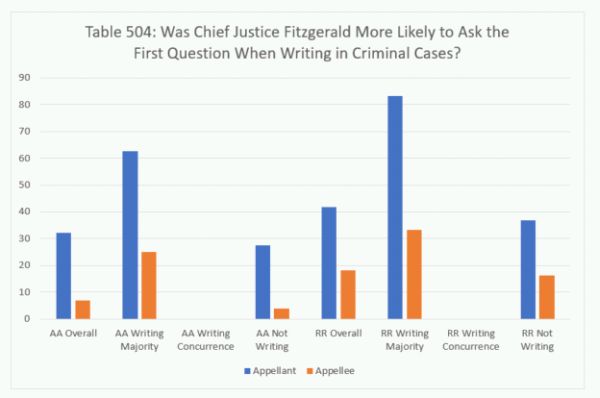Yesterday, we reviewed the data for Chief Justice Fitzgerald's question pattern in criminal cases between 2008 and 2010. Today, we look at a different aspect of the data – was the Chief Justice more likely to ask the first question of either side, depending on how he was voting and whether he was writing an opinion?
The Chief Justice was far more likely to ask the first question of appellants when he ultimately voted to affirm. He asked the first question in criminal affirmances 32.2% of the time, to only 6.78% of appellees. As usual, writing the majority opinion had a substantial effect. When he was writing the majority opinion, Chief Justice Fitzgerald asked the first question of appellants 62.5% of the time, and of appellees 25% of the time. When not writing an opinion, Chief Justice Fitzgerald asked the first question of appellants 27.45% of the time, and of appellees 3.92% of the time.
For reversals, the Chief Justice once again was more likely to start the questioning of an appellant. He began with appellants 41.82% of the time, but only 18.18% of the time with appellees. Writing the majority opinion had a substantial impact. When writing the majority in a reversal, there was an 83.33% chance that the Chief Justice would ask the first question, and a one-in-three chance that he would ask the first question of appellees. When not writing an opinion, there was a 36.73% chance that Chief Justice Fitzgerald would ask the first question of appellants, and a 16.33% chance that he would ask the first question of appellees.

As we noted yesterday, Chief Justice Fitzgerald didn't vote in the minority in a single one of the criminal cases where he heard argument and voted between 2008 and 2010. In the cases where he heard argument but retired before the decision, Chief Justice Fitzgerald asked the first question in only two – both times, of the appellee. In one of those cases, the firm ultimately affirmed 7-0. The other was the case we discussed yesterday, where Chief Justice Fitzgerald questioned the appellees much more heavily, but the Court ultimately affirmed with modifications by a vote of 4-3.
Join us back here next Tuesday as we turn our attention to Chief Justice Fitzgerald's successor, Justice Mary Jane Theis.
The content of this article is intended to provide a general guide to the subject matter. Specialist advice should be sought about your specific circumstances.

